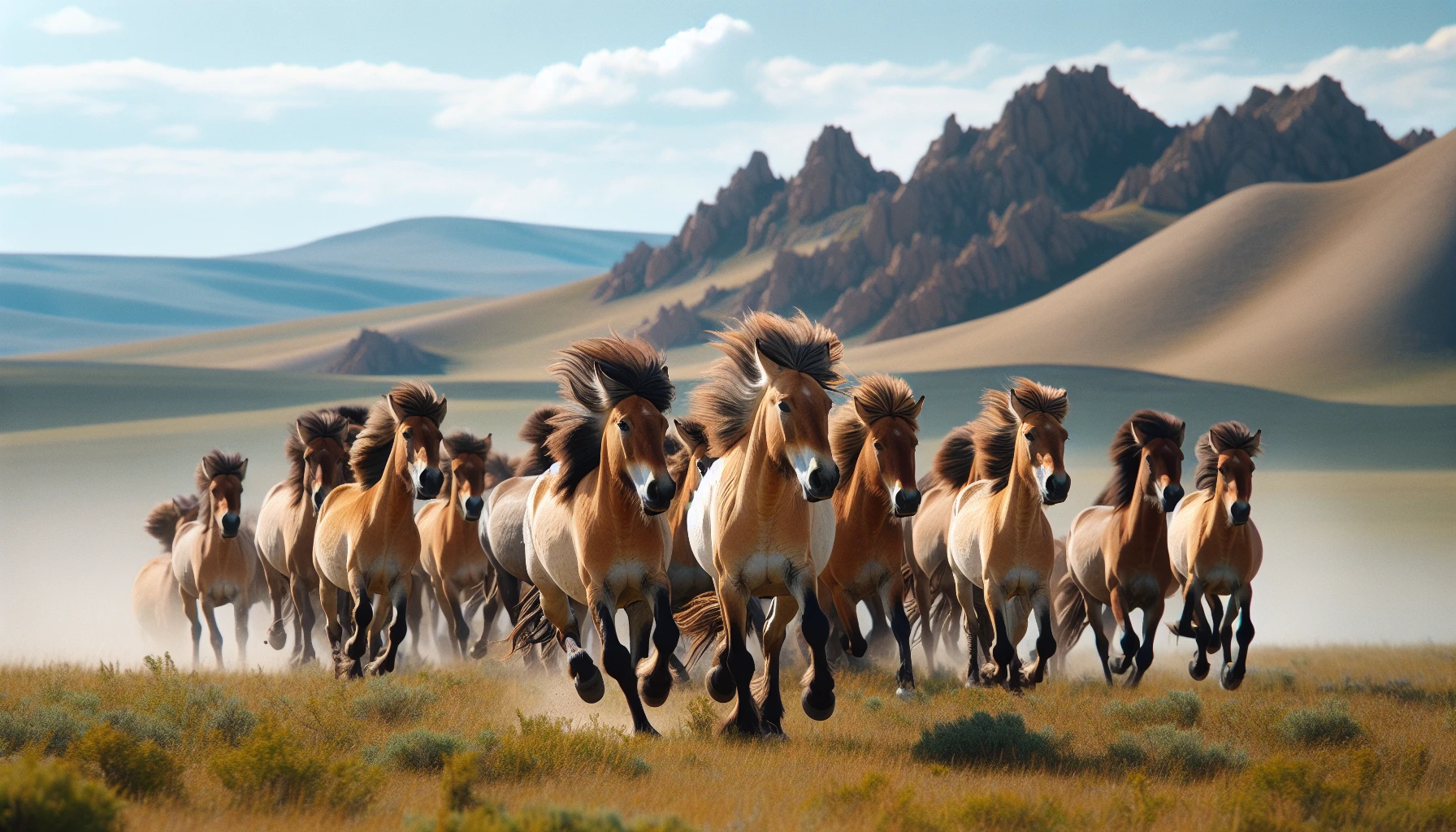Khustain Nuruu Travel Guide: Explore the Wild Home of Mongolia’s Przewalski Horses
Introduction to Khustain Nuruu
Welcome to Khustain Nuruu National Park, a sweeping landscape of steppe, forest, and rolling hills just 100 km west of Mongolia’s capital, Ulaanbaatar. Known worldwide for its successful reintroduction of the Przewalski’s horse—called Takhi in Mongolian—Khustain Nuruu is a symbol of conservation and Mongolian ecological pride.

This protected area is not just about wildlife—it’s a place where nature, traditional nomadic culture, and history intersect. From camping under the stars to tracking herds of Takhi on foot or horseback, Khustai (as it's often called) is an unforgettable experience for nature lovers and explorers.
📍 Where Is Khustain Nuruu?
Country: Mongolia
Province: Töv Aimag
Distance from Ulaanbaatar: ~100 km (~2-hour drive west)
Located on the southern fringe of the Khentii Mountain range, Khustain Nuruu spans over 50,000 hectares of protected land, and serves as a prime location for wildlife viewing and eco-tourism.
🌟 Why Visit Khustain Nuruu?
✅ See the Rare Takhi (Przewalski's Horse)
Only place in the world to see wild Takhi roaming freely
Reintroduced after extinction in the wild during the 1960s
One of Mongolia’s proudest conservation successes
✅ Wildlife Watching in Natural Habitat
Home to deer, marmots, red foxes, lynx, and over 200 bird species
Best times: early morning and sunset
✅ Accessible Wilderness Near Ulaanbaatar
Perfect for short trips and day tours
Can be combined with nomadic stays or cultural tours
✅ Rich Nomadic Culture
Interact with herder families living near the park
Experience traditional ger stays, horse riding, and Mongolian cuisine
🐾 Top Things to Do in Khustain Nuruu
1. Takhi Watching
Best done in early morning or evening
Use binoculars to observe herds on distant ridges
Quiet approach increases your chances of spotting them up close
Fun Fact: Takhi are the only true wild horses left on Earth—not descended from domesticated breeds.
2. Wildlife Photography & Birdwatching
Khustai’s grasslands and riverbanks attract:
Golden eagles
Cinereous vultures
Eurasian kestrels
Steppe eagles
Perfect for nature photographers and bird lovers
3. Hiking the Steppe and Hills
Trails range from 2–8 km
Explore open valleys, rocky outcrops, and forested slopes
Panoramic views from ridge tops
4. Visit the Park Museum
Learn about:
The Takhi reintroduction project
Flora and fauna of the park
Nomadic lifestyles and conservation efforts
5. Stay in a Ger Camp
Sleep in traditional Mongolian gers
Enjoy local meals like khorkhog or buuz
Listen to folk songs under the stars
🛖 Where to Stay
1. Eco Tourist Ger Camps
Located near the park entrance
Facilities include:
Private gers
Dining halls
Shower and bathroom blocks
Popular camps:
Khustai Camp
Steppe Nomads Camp
2. Homestays with Nomadic Families
Deeper cultural immersion
Help with daily chores, cook with the family, and join horseback rides
Available via local tour agencies
3. Camping
Permitted in designated zones
Must bring all supplies and practice Leave No Trace principles
🚗 How to Get There
🚙 By Car (Most Common)
2-hour drive from Ulaanbaatar
Roads are mostly paved, with gravel inside the park
🚌 By Public Transport
Not recommended—public buses don’t reach the park entrance directly
Arrange private transfer or join a tour
🐎 Guided Tours
Most tour operators in Ulaanbaatar offer:
Day trips
2–3 day packages
Combo tours with Elsen Tasarkhai dunes or Karakorum
📆 Best Time to Visit Khustain Nuruu
| Season | Highlights | Notes |
|---|---|---|
| May–June | Green landscapes, active wildlife | Best Takhi sightings |
| July–August | Warmest, good for ger stays | Peak tourist season |
| September | Fall colors, fewer visitors | Great light for photography |
| October–April | Cold and snowy | Wildlife harder to spot, few tours operate |
🧳 What to Pack
| Item | Reason |
|---|---|
| Binoculars | Spot Takhi and birds from afar |
| Warm layers | Even summer nights get chilly |
| Sunscreen & hat | Strong sun on the open steppe |
| Hiking shoes | Uneven trails and rocky paths |
| Flashlight/headlamp | Useful in gers and camps |
| Refillable water bottle | Eco-friendly and essential |
🧘 Tips for Responsible Travel
Keep noise low near wildlife areas
Stay on trails and don’t chase animals
Do not feed or touch wild animals
Ask before photographing local people
Leave the land as you found it—take trash with you
🗺 Sample 2-Day Itinerary in Khustain Nuruu
📍 Day 1:
Morning: Depart Ulaanbaatar, arrive at park entrance
Afternoon: Visit park museum and begin short trek
Evening: Takhi observation at sunset, ger stay with dinner
📍 Day 2:
Early morning: Wildlife spotting hike
Breakfast at camp
Optional horseback ride or visit nearby herder family
Return to Ulaanbaatar by afternoon
🧠 Did You Know?
The Takhi can reach speeds of up to 64 km/h
Takhi are shorter and stockier than domesticated horses and never tamed
Khustain Nuruu is a UNESCO Biosphere Reserve
The park’s name means "Birch Mountains" in Mongolian
🎉 Local Events & Cultural Highlights
Naadam Festival (July): Traditional games like wrestling, archery, and horse racing in surrounding provinces
Takhi Festival (occasional, varies by year): Celebrates the return of the wild horse with tours, music, and environmental awareness
🌄 Final Thoughts
Khustain Nuruu is more than just a national park—it’s a living success story of wildlife preservation and a window into Mongolia’s timeless relationship with the natural world.
From spotting the elusive Takhi to sipping tea in a ger under the open sky, this region offers the perfect combination of nature, culture, and history. Whether you have one day or a weekend, Khustai invites you to slow down, observe, and reconnect with the wild heart of Mongolia.
